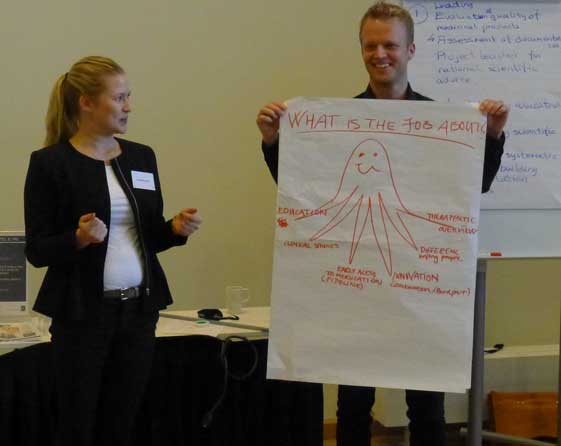Bloggers: Erik Ingebrigtsen and Hanne Lehn
PhD candidates from four different Norwegian universities met in Oslo on 5-6 November for the first National innovation workshop for PhD candidates in neuroscience. The event was jointly organized by Nansen Neuroscience Network (NNN) and the Norwegian Research School in Neuroscience (NRSN).
The aim of the workshop was to make young researchers more aware of the innovative potential of their own research, and how to proceed if they make discoveries that can be developed into a product of clinical or commercial interest. Also, the workshop demonstrated attractive career opportunities for the candidates outside Academia, both in private and public sector.
Neurodegenerative diseases account for a large proportion of the public health challenges facing our society. Also, our increased understanding of the normally functioning brain has great potential for future clinical applications. Both perspectives pinpoint the need for increased utilization of new discoveries from neuroscience research. The Norwegian Research School in Neuroscience (NRSN) is a nationwide network including 130 PhD candidates in the field. Some of these young scientists will become future research leaders in Norway. However, in a majority of cases, the unique competence of these PhD candidates will come to use in a variety of other sectors, from industry to government and funding agencies. More than 80% of people holding a PhD in Norway are not primarily working in research and development
Nansen Neuroscience Network takes particular interest in the PhD candidates in the field. NNN’s member organizations include all the major Norwegian research institutions and scientific groups in the field, the technology transfer offices, funding agencies and relevant industry – both the smaller start-up enterprises and multinational pharmaceutical companies. The workshop took advantage of NNN’s extensive network and hosted an impressive group of 18 speakers and group session moderators, representing venture capital companies, industry, tech-trans offices, Innovation Norway and the Research Council of Norway.
During one of the group sessions, each PhD candidate delivered a two-minute pitch, presenting the innovative potential of their own research. The presentation was then discussed by the moderator and with the other PhD candidates in the group. For some participants it was a challenging exercise to change perspective from a strict focus on their own specific research questions, to explaining a future innovative potential. However, the participants reported that such challenges help them see their own results and qualifications in a different light, and toacknowledge the relevance of their research to the larger society.

Top, left: Axel Nyman, NTNU, giving his 2-minute pitch.
Top, right: Jørgen Nordahl, NTNU Technology Transfer, and his group.
Left: Soulmaz Rahmani (UiO) and investor Ingrid T. Akay, Hadean Ventures.
Right: Gry Vindedal (UiO) presents groups results on career opportunities
In a separate session on career planning, six representatives from industry, pharmaceutical companies, and funding- and government agencies were interviewed by the PhD candidates on three questions: – What is your job about? How does your PhD background help you in fulfilling the demands of the job? And – crucially – How did the group leaders succeed in securing their current position? The presentations of each group illustrated that there are many possible paths to enter a career outside academia.
An important result of the meeting is that NRSN and NNN now have established a new arena where innovation-oriented PhD candidates in neuroscience can meet and exchange ideas and experiences directly with each other. Future events will aim towards extending this network with new members, to create a stronger platform among future leaders in the field.

